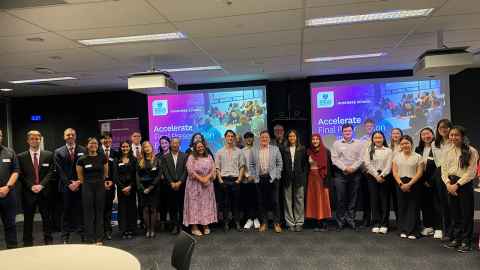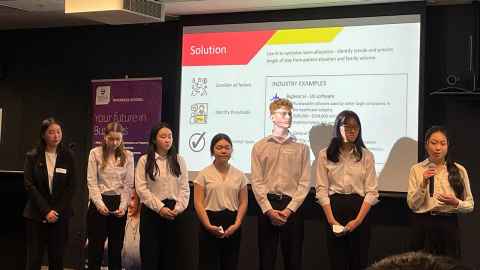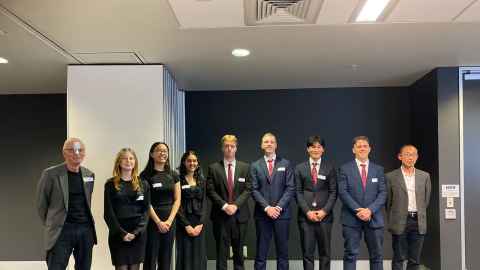Business students give their time to well-known charity - and gain real-world experience
13 December 2023
First-year Business School students worked in teams to address real-world challenges facing Ronald McDonald House Charities.

Semester Two saw the return of the hugely successful Accelerate Programme, which was created in 2017 with the aim of connecting high-achieving, community-minded Business School students with Kiwi not-for-profits and charities seeking support in solving business challenges. Working in teams, the students spend a semester developing solutions to address a particular issue or issues identified by these organisations. The programme is a mutually beneficial one: the charities receive helpful and often highly innovative strategies for improvement while the students gain valuable experience in solving real-world business problems – as well as the satisfaction of contributing to their communities. “Accelerate appealed to me as a unique opportunity to extend the thinking and skills gained during my first semester at University and to utilise them in a real-world consulting problem. Moreover, it presented a fulfilling way to give back to the local community and thus give me pride in the work that I would be doing,” explains one of this year’s Accelerate Programme students, Guy Grantham.
Each year, high-achieving first-year Business School students are invited to apply for the programme. Places are highly sought-after, notes Dr Herbert Sima, one of the programme’s six staff mentors. “It’s very competitive. This year we selected 21 students out of 120 applicants.” Selection is based on academic performance, peer evaluation and a personal statement from each student. “We want to take those students who are very motivated and willing to apply their knowledge to give back to the community,” he explains. It’s important to note that the Accelerate Programme is a volunteer exercise – the students receive no grades or credits for their efforts, and for the six staff mentors it is an “above-workload” professional endeavour.
The successful applicants were placed into three teams of seven students, with each team assigned two staff mentors. Being placed into such large teams presented the students’ first challenge, recalls Herbert: “It really helped them to understand how to work with people who are in similar situations [to themselves] – high calibre students who are super-busy with study and other things. It was fascinating to see the students were really resilient [in terms of] accommodating other students’ busy schedules."

The three teams were then set a brief by this year’s Accelerate Client Organisation, Ronald McDonald House Charities. RMHC New Zealand supports families when their child requires medical care at a New Zealand hospital away from home, providing accommodation and support free of charge at its facilities throughout New Zealand. Their brief was “dual-pronged”, explains Dr Parizad Mulla, another of Accelerate’s staff mentors. “The client wanted us to find them artificial intelligence solutions to help with fundraising, donor management and in-house administrative tasks. The challenge was to do so in a manner that found mechanised solutions to problems in a very sensitive human context.”
The teams spent ten weeks working on solutions before presenting and justifying their ideas to the RMHC Chief Operating Officer, Chief Financial Officer and Chief Technology Officer at a final judging event last month – although as the Accelerate Programme’s focus is to support the client and to encourage students to become involved with their community, there is never a “winning” team per se. Rather, the client selects the team whose proposed strategy and performance resonates with them the most.
This experience taught me that being in unfamiliar situations fosters new creative ways to solve problems – which is exactly what Accelerate’s clients are looking for.
The three teams took quite different approaches to the brief, explains Parizad. “Some took a macro lens to solve large logistical issues, while others took a more micro lens to assist with and streamline day-to-day interactions in the RMHC houses.” The response from the judging panel was overwhelmingly positive, she says. “The feedback from the client was that the students demonstrated a maturity beyond their years and produced excellent presentations that addressed the brief in a sophisticated and tangible manner. The client chose the more macro approach, but commended the ‘winning’ team not only on their excellent recommendations, but also on the polish and sophistication of their presentation skills.”
Herbert and his colleague Associate Professor Richard Brookes, staff mentors for the “winning” team, were also hugely impressed with the students’ presentation, says Herbert. “They were super-professional – more like MBA students than first-years. We really pushed them to take it seriously and put in the effort, and they took our advice on board, sharpening the content and the strategy. The way they delivered with passion and knowledge was incredible – the quality was just superb.”

Although obviously challenging on many levels – the time commitment alone is significant, notes Herbert – the Accelerate Programme proved to be a highly rewarding experience for the students involved. “Accelerate taught me to be comfortable with being uncomfortable,” observes Grantham. “Being thrown into real-world problems that require innovative solutions was daunting, especially when seeing the potential impact we could have. However, this experience taught me that being in unfamiliar situations fosters new creative ways to solve problems – which is exactly what Accelerate’s clients are looking for.”
Parizad agrees. “As always with Accelerate, the real winner was the not-for-profit client organisation that can benefit from the ideas of all three teams. In fact, Ronald McDonald House Charities, like many of our past clients, did say they intend to use ideas from all three teams.”
The programme’s format may not allow for a traditional winner, but it’s clearly a winning formula. Such is the programme’s appeal that many of those who participate choose to stay involved – past participant Michael Jury returned as a student mentor this year, and Associate Professor Richard Brookes has actually retired from the University, but continues to support the programme as a staff mentor. “We love the passion, we love to work with the industry, to help our students and also especially not-for-profit organisations,” enthuses Herbert. “It’s a beautiful thing.”
To learn more about the Accelerate Programme, please contact Dr Herbert Sima, h.sima@auckland.ac.nz.
Accelerate Staff Mentors are: Associate Professor Richard Brookes, Dr Douglas Carrie, Associate Dean of Learning and Teaching, Dr Michelle Kilkolly-Proffit, Director of Core Courses, Dr Parizad Mulla, Dr Nane Fifita and Dr Herbert Sima.